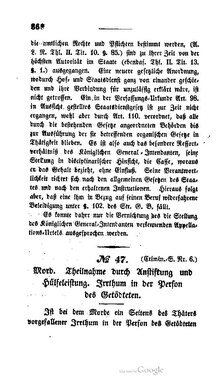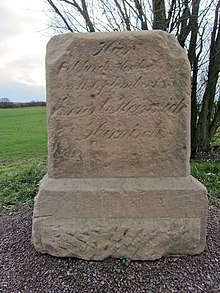Rose-Rosahl case

The Rose-Rosahl case, which is intensely discussed in criminal law, is based on a decision of the Prussian Higher Tribunal from 1859, which is printed in Goltdammer's Archives for Criminal Law . It deals with the legal problem of error in persona .
facts
The timber merchant Rosahl from Schiepzig promised the worker Rose that he would be generously rewarded if he shot the carpenter Schliebe from Lieskau . Rose then lay in ambush on September 11, 1858 around 8 p.m. between Lieskau and Schiepzig (near Halle ) in order to ambush Schliebe, whom he knew very well. In the twilight he saw a man coming along who he thought was Schliebe. In reality it was the 17-year-old high school student and cantor's son Ernst Heinrich Harnisch. Rose shot Harnisch with a shotgun load and then killed him with blows with the rifle butt. At the site of the murder there is now a memorial stone, the blood stone near Lieskau .
Problem
It is questionable how the error of the immediate perpetrator Rose about the person of his victim is to be judged, i.e. whether he is to be punished for murder of harness or for negligent killing of harness and attempted murder of Schliebe. From the point of view of the immediate perpetrator Rose, it is an error about the person of the victim ( Latin : error in persona ). The problem for which the Rose-Rosahl case is prototypical lies in the impact of the perpetrator's (Rose) error on the criminal liability of the instigator (Rosahl). Because it can be argued that from his point of view there is merely a failure of the means of crime (Latin: aberratio ictus ).
Decision of the Prussian Higher Tribunal
The jury court in Halle sentenced Rose to death on February 19, 1859 for the murder of Harnisch. The mistake about the identity of the victim (so-called error in persona) does not exclude intent . Rosahl was also sentenced to death for inciting Harnisch's murder. In the opinion of the court, the “error in persona” of the perpetrator was just as irrelevant for the instigator. The Prussian High Tribunal approved the convictions on May 5, 1859 as a court of appeal. Rose and Rosahl were executed.
evaluation
The decision of the Prussian Higher Tribunal soon became one of the constantly newly and controversially discussed problems of general criminal law.
Opinions of jurisprudence
The assessment of the effect of the error in persona of the main perpetrator on the instigator is controversial today. Some deny the intent of the instigator, since there is a causal course that deviates from his idea (so-called aberratio ictus ), others continue to decide like the higher tribunal at the time. Still others (such as Wolfgang Mitsch , Hermann Blei , Günther Jakobs or Georg Küpper ) advocate the theory of materiality (error considerable, if significant deviation from intent).
Court inheritance
Almost a century and a half after the decision of the Prussian Higher Tribunal, the Federal Court of Justice had to decide the classic constellation in 1990. The facts of this so-called Hoferbefall were:
- The accused had decided to kill Karl-Friedrich M. - his son from his first marriage and heir to the court. He succeeded in winning the co-defendant St. against the promise of a sum of money for the killing; as a father he himself felt incapable of committing the deed. St. was supposed to kill Karl-Friedrich M. in the horse stable, which he regularly crossed on his return home; the more detailed procedure was left to him. On November 25, 1985, St. went to the defendant's yard and into the horse stable. St. then waited in the stable for the victim to appear. It was dark, a certain brightness was only created by the fact that there was snow. Around 7 p.m., Bernd Sch., A neighbor, entered the yard and opened the stable door. He resembled Karl-Friedrich M. in stature and carried a bag in his hand, as M. also used to do. St. therefore assumed that Karl-Friedrich M. was in front of him and shot the unsuspecting Sch. from a short distance.
The Bielefeld Regional Court only sentenced the father for attempted incitement to murder and thus decided against the case law of the Prussian Higher Tribunal.
In its judgment of October 25, 1990, the 4th Criminal Senate of the Federal Court of Justice partially overturned the judgment of the lower court and decided that the perpetrator's mistake about the person of the crime victim is irrelevant to the instigator, since the perpetrator confused the victim within the There are limits to what can be foreseen according to general life experience. The modern supreme court case law thus essentially follows the line drawn up in the Rose-Rosahl case by the Prussian Higher Tribunal, the decision of which the Federal Court of Justice expressly cites.
See also
literature
- Matthias J. Maurer, Tristan Lang, Dörte Scheithauer: The Rose-Rosahl case . ISBN 3930195437
- Michael Kubiciel, Effects of an error in persona in the main perpetrator on the criminal liability of the instigator. The court heir case. In: Juristische Arbeitsblätter 2005, 694.
- Jan Dehne-Niemann / Yannic Weber, “On the influence of the error in the object in murder and in inciting this crime” - on the 150th anniversary of the Rose-Rosahl case. In: Legal Education 2009, 373.
Web links
Individual evidence
- ^ Goltdammer's Archive for Criminal Law 7, p. 322.
- ^ Birk Karsten Ecke: Lieskau near Halle an der Saale - The Blood Stone or the Rose-Rosahl case. In: harz-saale.de. December 4, 2012, accessed November 29, 2015 .
- ↑ Atonement Cross
- ^ Wessels, Johannes / Beulke, Werner , Criminal Law General Part , 40th Edition, Rn. 577 ff. With further references
- ↑ BGHSt 37, 214 ; Wessels, Johannes / Beulke, Werner , Criminal Law General Part , 40th Edition, Rn. 579
- ↑ BGHSt 37, 214 - Az. 4 StR 371/90
